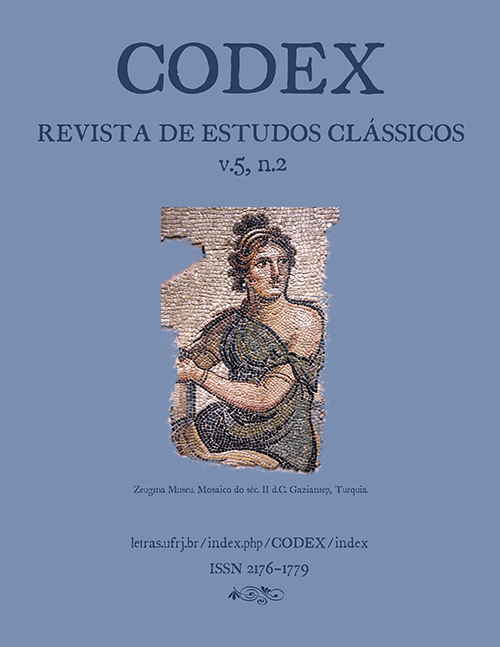Socrates' last defense: the body as a metonymy of the sensible
DOI:
https://doi.org/10.25187/codex.v5i2.13495Keywords:
Plato, defenses of the philosophical life by Socrates, Gorgias, Apology, Crito, Phaedo.Abstract
Socrates defends the philosophical life under the threat of death penalty in four Dialogues by Plato: Gorgias, Apology, Crito, and Phaedo. The latter resumes and summarizes the previous ones as to this defense. In the Phaedo, through a series of repeated and crisscrossed indications of the rhetorical and philosophical appropriation of the mythical repertoire of images, death becomes a metaphor for knowledge, the body becomes metonymy of the sensible, God Hades metaphor of the intelligible and the Gods antonomasia of ideas or intelligible forms. If the sense of this appropriation were taken into account in the reading of the dialogue, its understanding would, in my point of view, undergo a turnaround and become much more philosophical.References
GUTHRIE, W. K. C. The Greeks and their Gods. Boston, Beacon Press, 1951.
PLATÃO. Fédon. Tradução de de Jorge Paleikat. São Paulo, Abril Cultural, 1979.
PLATÃO. Fedro. Tradução de José Ribeiro Ferreira. Lisboa, Edições 70, 1997.
PLATÃO. Górgias. Tradução de Daniel R. N. Lopes. 1ª. Edição. São Paulo, Perspectiva/Fapesp, 2011.
PLATÃO. A República. Tradução de Anna Lia Amaral de Almeida Prado. São Paulo, Martins Fontes, 2006.
Downloads
Published
2017-12-28
How to Cite
Torrano, J. (2017). Socrates’ last defense: the body as a metonymy of the sensible. CODEX - Revista De Estudos Clássicos, 5(2), 1–10. https://doi.org/10.25187/codex.v5i2.13495
Issue
Section
Articles
License
This work is licensed under a Creative Commons Attribution-NonCommercial 4.0 International License.










